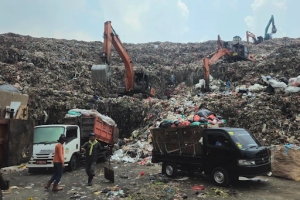There was a time when Bali was the dream destination for travelers seeking not only beauty and adventure, but also a sense of the sacred. People came for the lush rice terraces, the gentle ceremonies, and the feeling that the island itself was alive with spirit. For decades, Bali was known as the last paradise. Today, however, that title is slipping away. Many who love Bali now call it the lost paradise.
The Warning Signs: Floods, Pollution, and Overdevelopment
The signs are everywhere. Flash floods have become more frequent and more severe. The rivers overflow, roads are washed out, and homes are damaged. These floods are not just natural disasters. They are a stark warning that something is deeply wrong with how the land is being used. Governor Wayan Koster recently pointed out that the widespread conversion of rice fields and dry fields into commercial developments is a major cause. When rice paddies are paved over to build villas, resorts, and restaurants, the land can no longer absorb rainwater. Water catchment areas vanish. The result is flooding, erosion, and a loss of the fertile soil that has fed Balinese families for centuries.
Air pollution is another growing crisis. Once, the air in Bali was clean and scented with frangipani and incense. Now, the haze from burning trash, traffic congestion, and unchecked construction fills the lungs of locals and visitors alike. The roads are crowded with motorbikes, trucks, and cars. Many vehicles are old and poorly maintained, which adds to the pollution. During the dry season, the air can feel heavy and oppressive. People with asthma or respiratory issues find it harder to breathe. The once-inviting breezes now carry the smell of exhaust and smoke.
Water pollution is also a daily struggle. In some areas, it is almost impossible to get pure, safe water from the tap. Many homes and businesses rely on bottled water or expensive filtration systems. Rivers and streams, once used for bathing and ceremonies, are now choked with plastic and waste. The lack of proper sewage and waste management means that pollutants seep into the groundwater, affecting not only the environment but also public health.

The New Policy: A Step in the Right Direction
In response to these crises, the Bali Provincial Government has finally taken a bold step. Governor Koster has introduced a new policy that restricts the construction of hotels, restaurants, and other tourism facilities on productive land. This regulation will take effect in 2025, as part of the Bali 100-Year Policy vision. The goal is to stop the conversion of rice fields and agricultural land into commercial properties. Local governments have been instructed to tighten business permits, especially for projects targeting farmland. This moratorium is intended to protect Bali’s food security, cultural heritage, and natural environment.
The policy does not prevent residents from building homes on their own land. It is aimed squarely at large-scale commercial projects that threaten the balance between development and nature. Farmers and environmental activists have welcomed the move. They see it as a crucial moment to reorient Bali’s development toward sustainability. If implemented properly, this policy could help reduce the risk of ecological disaster and preserve the unique character of the island.
The Cultural Cost: Losing the Soul of Bali
Bali’s rice paddies and subak irrigation systems are not just sources of food. They are the heart of Balinese culture. The intricate network of fields and water channels is maintained by local communities, who see themselves as stewards of the land. The daily offerings, the ceremonies, and the humble gratitude for each harvest are woven into the fabric of life here. When rice fields are replaced by luxury villas, something irreplaceable is lost. The landscape changes, but so does the sense of community and the connection to the gods.
The Hindu religion in Bali teaches gratitude and humility. Every day, families place offerings at their doorways, thanking the gods for their blessings. Life is lived in harmony with nature, or at least that is the ideal. Yet, as more land is bought up for profit, and as outsiders build without understanding or respecting local traditions, this harmony is threatened. The island becomes a commodity, not a home.
The Role of Expats: Allies in the Fight for Bali’s Future
It is not only locals who are concerned. Many expats, some of whom have lived in Bali for years or even decades, are joining together to help solve these problems. They organize clean-up events, support local farmers, and advocate for better waste management. They use their voices, their networks, and sometimes their resources to push for change. These expats care deeply about the island and want to see it thrive, not just as a tourist destination, but as a living, breathing community.
However, expats often feel that their voices are not heard. They may not have the right to vote or make policy, but they have valuable perspectives and skills. Including them in the conversation, listening to their ideas, and working together with local communities can only strengthen Bali’s future. The problems facing Bali are too big for any one group to solve alone. It will take cooperation, respect, and a willingness to learn from each other.
Solutions: What Needs to Be Done
First and foremost, the government must enforce the new moratorium on developing productive land. This means not only passing regulations but also monitoring and penalizing violations. Corruption and loopholes must be addressed. Transparency is key. The government could also invest in modern waste management systems, including recycling and composting. Burning trash in the open should be banned, and alternatives provided.
Roads need to be repaired and maintained. Traffic management should be improved, perhaps with better public transportation or incentives.. Air quality monitoring should be expanded, and steps taken to reduce emissions from vehicles and construction.
Clean water access is essential. The government and private sector could work together to upgrade water treatment facilities and protect watersheds. Education campaigns can help people understand the importance of not dumping waste into rivers and streams.
Tourism should be reimagined. Rather than focusing on quantity, Bali should aim for quality. Eco-friendly tourism, cultural experiences, and community-based projects can provide income without destroying the environment. Tourists should be encouraged to respect local customs, reduce their plastic use, and support businesses that prioritize sustainability.
Finally, everyone who loves Bali – locals, expats, and visitors – must take responsibility. Small actions matter. Picking up trash, using less plastic, conserving water, and supporting local farmers are all steps in the right direction. Speaking up, sharing information, and holding leaders accountable are just as important.

A Plea for Bali’s Future
Bali is at a crossroads. The choices made now will determine whether it remains a paradise or becomes a cautionary tale. The beauty of Bali is not just in its landscapes, but in the spirit of its people and the balance they have maintained for generations. Let us not lose that. Let us work together, with humility and gratitude, to restore what has been lost and to protect what remains.
If Bali is to be more than just a memory, if it is to be a place where future generations can feel the earth’s energy and the warmth of its people, then the time to act is now. Let us honor the island, its gods, and its people by choosing a path of respect, sustainability, and shared responsibility.











